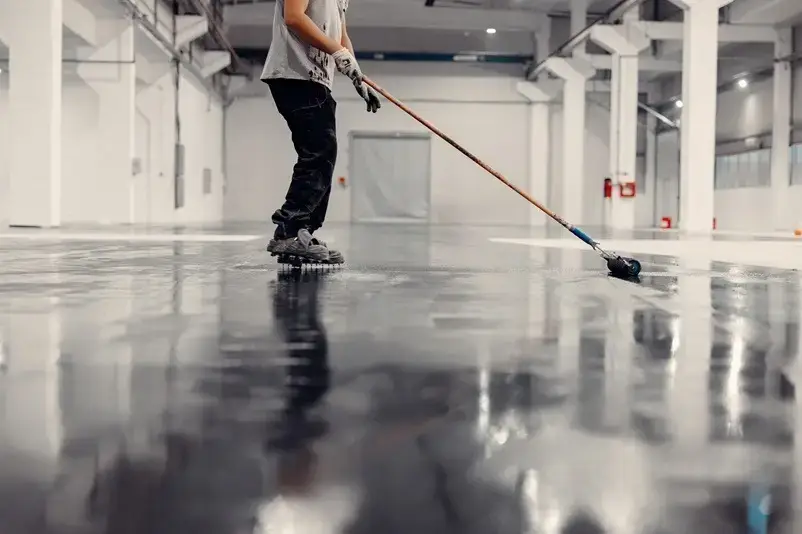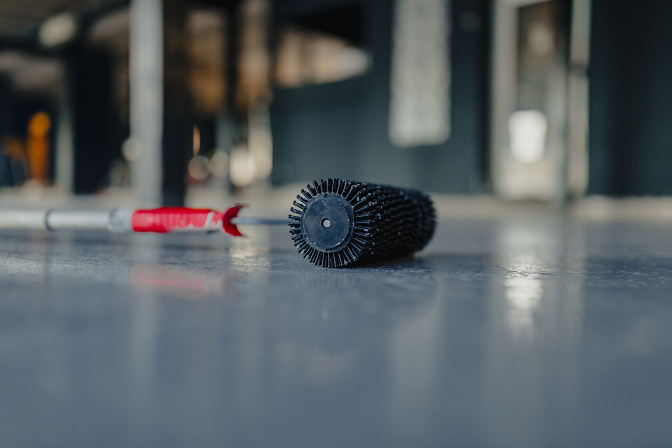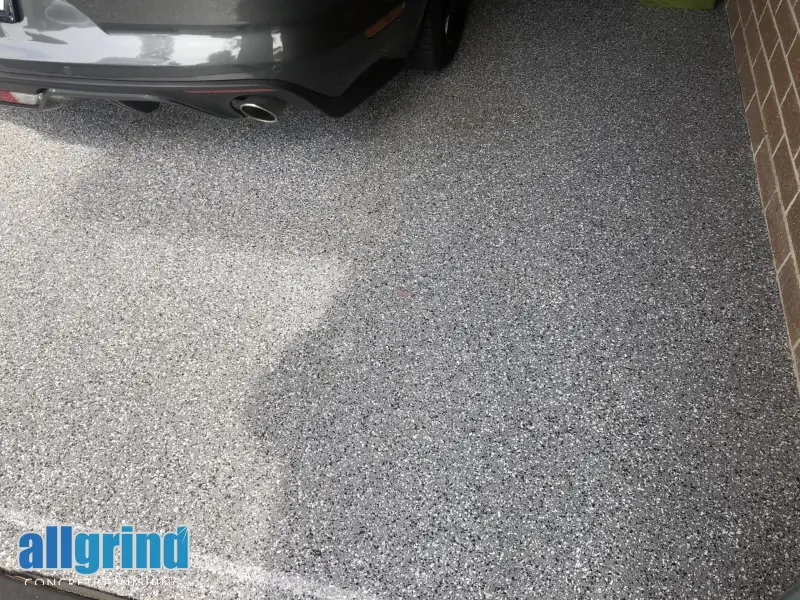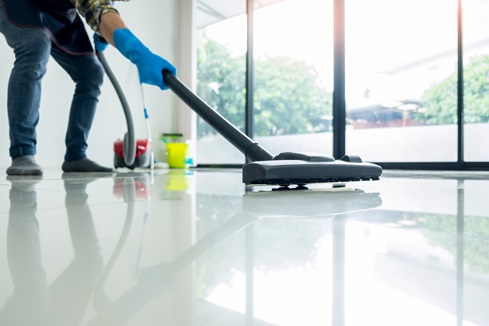Epoxy garage floors transform ordinary garages into visually appealing and durable spaces. Using resin and hardener, epoxy creates a hard, plastic-like surface over existing floors, making it an ideal solution for garages. This flooring option is resistant to stains and water plus boasts the strength to withstand shock, heat, and heavy machinery without showing signs of wear. Its seamless, shiny appearance offers an attractive upgrade for various types of buildings, making epoxy floors for garages a popular choice.
Opting for epoxy flooring for your garage ensures a cost-effective, long-lasting solution. The seamless and easily cleanable surface simplifies maintenance and presents a safety feature with the option for anti-slip coatings to prevent accidents. As the demand for durable and attractive flooring options grows, the versatility of epoxy coating for garage floors, available in styles like garage floor epoxy and garage epoxy flooring, makes it a top pick for homeowners looking to enhance their garages.
With Melbourne growing by 165,000 residents in the last year (2023), the population is booming, putting pressure on housing. This has seen smaller backyards becoming the norm across the suburbs of Melbourne. Especially in the new housing growth areas like Mernda, Melton, Wollert, Donnybrook, Kalkallo, Mickleham and Wyndham. So the humble garage that’s just for your car park is becoming outdated. It’s a huge amount of square footage that can be so much more versatile. And an epoxy floor is how you make it versatile.
What is Epoxy Flooring?

Epoxy flooring, a robust solution for various settings, is a composite of resin and hardener. When these components mix, they bond to the substrate—concrete, wood, or tile—creating a durable plastic surface. This reaction not only secures the epoxy to the floor but also forms a resilient barrier against daily wear and tear. Here’s a breakdown of what makes epoxy flooring stand out:
Composition and Application
- Two-Part System: Combines polymer resins and hardeners.
- Chemical Bonding: Results in a tough, plastic-like material.
- Versatile Substrates: Adheres to concrete, wood and more.
Key Characteristics
- Durability: Forms a strong, permanent bond with the floor.
- Seamless and Non-Porous: Simplifies cleaning, and resists chemicals.
- Customisable: Available in a variety of colours and styles.
Types and Uses
- Self-Levelling and Mortar Epoxy: Ideal for uneven surfaces and repairs.
- Decorative Options: Epoxy Terrazzo and Flake Coatings enhance aesthetics.
- Specialised Systems: Anti-static and food-grade options for specific needs.
Epoxy’s unique formulation and application process ensures a flooring solution that is not only visually appealing but also capable of withstanding the rigours of high-traffic environments, making it a preferred choice for garages, industrial settings, and more.
Benefits of Choosing Epoxy for Your Garage Floor

Epoxy garage floors bring a plethora of advantages that extend beyond mere aesthetics, ensuring both functionality and durability. Here are the top 3 key benefits:
1.Durability and Resistance
Epoxy floors stand out for their resilience. They are resistant to wear, chemicals, chipping, and damage, making them an ideal choice for high-traffic areas like garages. This durability also translates to a long-lasting surface that can endure the rigours of garage use without succumbing to the usual wear and tear.
- Chemical Resistance: Immune to motor oil, gasoline, bleach, and more.
- Impact Resistance: Can withstand heavy drops without cracking.
2. Maintenance and Safety
One of the most appealing features of epoxy flooring is its ease of maintenance. The seamless surface allows for easy cleaning, often requiring nothing more than soap and water. Additionally, the option for anti-slip coatings enhances safety, reducing the risk of accidents in the garage.
- Easy Cleaning: A mop and mild detergent are usually enough.
- Anti-Slip: Optional coatings can significantly reduce slipperiness.
3. Aesthetic and Economic Benefits
Beyond functionality, epoxy garage floors offer aesthetic versatility with various colours and finishes available, including options with decorative flakes. This can significantly enhance the garage’s appearance, potentially increasing the home’s value. Furthermore, the cost-effectiveness of epoxy flooring, combined with its long lifespan, presents a valuable investment for homeowners.
- Visual Appeal: Wide range of colours and textures.
- Cost-Effectiveness: Offers a good return on investment due to its durability and low maintenance requirements.
Epoxy Flooring Styles and Finishes

When exploring the diverse world of epoxy garage floors, homeowners and businesses alike are met with an array of styles and finishes, each offering unique benefits and aesthetic appeal.
Metallic Epoxy Flooring: Known for its shimmering appearance, metallic epoxy flooring mixes metallic colour pigments with epoxy to achieve a dynamic, colour-changing effect. This finish is equally popular in residential garages and commercial spaces, adding a touch of sophistication.
Flake Options: Flake Epoxy Flooring, on the other hand, uses coloured vinyl flakes to create a textured surface that mimics terrazzo, offering both durability and aesthetic appeal. The versatility in flake size allows for customization, with smaller flakes creating a mixed-colour look and larger flakes suited for single-colour installations.
Solid Colour and Quartz Finishes: Solid Color Epoxy Flooring provides a range of vibrant colours, made with rich epoxy colour pigments known for their adhesion and resistance properties. Quartz Epoxy Flooring incorporates coloured quartz aggregates topped with a polyaspartic coat, ideal for areas requiring significant traction and durability.
These options cater to varying preferences and functional requirements, ensuring there’s an epoxy flooring style to suit every garage.
DIY vs. Professional Epoxy Floor Installation
When deciding between DIY and professional epoxy garage floor installation, several key factors come into play, each impacting the final result’s quality, durability, and appearance.
Preparation and Application Techniques:
- Professional Installation: Utilises diamond grinding or shot-blasting for concrete preparation, ensuring a stronger bond and a smoother, higher-quality finish with thickness ranging between 15 to 30 mils.
- DIY Installation: Typically involves mild acid etching, resulting in a less roughened surface and a coating thickness of around 5 mils. This method can lead to a smooth finish but may lack the overall quality and durability of professional work.
Time and Durability:
- Professional Installation: Can be completed in 5-8 hours over two days, offering a durable coating that can last upwards of twenty years.
- DIY Installation: This may consume an entire weekend or more, with a lifespan of one to five years due to potential peeling or delamination.
Cost and Aesthetic Options:
- Professional Installation: Costs range between $2,000 and $4,000 for a two-car garage, offering a lifetime warranty, greater colour choices, and safer, more decorative floors.
- DIY Installation: Costs between $500 and $1500, with limited colour options and a higher likelihood of a less decorative and potentially slippery surface.
Opting for professional installation is recommended for those seeking optimal results, durability, and a wider range of aesthetic choices, despite the higher upfront cost.
Maintenance and Care for Epoxy Garage Floors

Maintaining epoxy garage floors is straightforward, ensuring their longevity and aesthetic appeal. Here are key practices for care:
Routine Cleaning:
- Sweep or vacuum regularly to remove dirt and debris.
- For spills – mopping with warm water.
- Employ a soft bristle brush or a hard foam mop to avoid scratching the surface.
Deep Cleaning and Maintenance:
- Scrub the floor monthly or as needed in high-traffic areas using a warm mop and a suitable degreaser.
- Address liquid spills immediately to prevent damage.
- For stubborn stains, such as grease or oil, scrub with detergent. Rubber burns can be removed with a citric acid cleaner and a stiff brush.
Preventive Measures:
- Place mats at workstations and entry doors to minimise dirt.
- Use furniture pads under heavy items to prevent scratches.
- Avoid using harsh chemicals or soap-based cleaners that can discolour the floor.
Conclusion
So now you have seen the benefits of epoxy garage floors – from its impeccable durability and resistance to various forms of wear and tear to its visual appeal and cost-effectiveness. The seamless integration of functionality and style presents a compelling case for choosing epoxy as a flooring solution. Whether examining the technicalities of its application, the breadth of aesthetic finishes available, or the detailed comparison between DIY and professional installation, it becomes clear that epoxy flooring stands out as a superior option for garages, promising longevity, utility, and aesthetic versatility. We have listed some common questions our Allgrind team gets from customers to hopefully answer any questions you may have after reading this blog.
FAQs
What advantages do epoxy garage floors offer?
Epoxy garage floors are favoured by many due to their numerous benefits. These floors provide a smooth, seamless finish that is resistant to stains, chemicals, and abrasions. This makes epoxy an attractive and practical flooring solution for garages, which are typically high-traffic areas.
After applying an epoxy coating, how soon can you walk on a garage floor?
You can usually walk on an epoxy-coated garage floor within 12 to 24 hours after application. However, it’s crucial to remember that the floor isn’t fully cured and hardened until after approximately 72 hours, with the exact time depending on the ambient temperature and humidity levels.
How Long Does Epoxy Garage Flooring Last?
Epoxy garage floors are renowned for their durability and longevity. When properly installed and maintained, an epoxy floor can last anywhere from 15 to 20 years in a residential garage. The lifespan can vary based on factors such as the amount of vehicular traffic, exposure to chemicals, and adherence to maintenance recommendations. Regular cleaning and avoiding harsh impacts or scratches can extend its life even further.
Is Epoxy Flooring Slippery When Wet?
Epoxy floors can be slippery when wet, due to their seamless and smooth finish. However, this concern can be mitigated during the installation process. Adding textural elements such as colour flakes or a topcoat with anti-slip additives can greatly reduce slipperiness and enhance safety. These options provide extra grip and make the floor safer under wet conditions, making them an ideal choice for garages that may get damp or oily.
